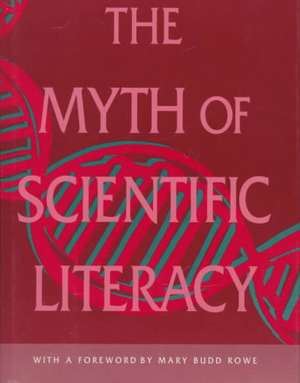The Myth of Scientific Literacy
Autor Morris Shamosen Limba Engleză Hardback – mai 1995
Why do we make every schoolchild and college student take science? Does every American really need to be scientifically literate? In this provocative book, Morris Shamos, a physicist and science educator of very broad experience, argues that universal scientific literacy is a futile goal, and urges a critical review of the purpose of general education in science. Shamos argues that a meaningful scientific literacy cannot be achieved in the first place, and the attempt is a misuse of human resources on a grand scale. He is skeptical about forecasts of Òcritical shortfalls in scientific manpowerÓ and about the motives behind crash programs to get more young people into the science pipeline. Finally, he is convinced that, as presently taught, the vast majority of students come out of science classes with neither an intellectual grasp nor a pragmatic appreciation of science.
Shamos advocates instead a practical science education curriculum that grants the impossibility of every American learning enough science to make independent judgments about major scientific issues. Rather than giving children the heavy diet of scientific terms and facts they now get, he would emphasize: an appreciation of science as an ongoing cultural enterprise; an awareness of technologyÕs impact on one's personal health, safety, and surroundings; and the need to use experts wisely in resolving science/society issues.
Whether you loved or hated your science classes, you will find Morris ShamosÕs arguments about the future of science education required reading. Teachers, parents, scientists, science educators, school administrators, legislators, and science and human resources policy analysts will be especially interested in this book.
Shamos advocates instead a practical science education curriculum that grants the impossibility of every American learning enough science to make independent judgments about major scientific issues. Rather than giving children the heavy diet of scientific terms and facts they now get, he would emphasize: an appreciation of science as an ongoing cultural enterprise; an awareness of technologyÕs impact on one's personal health, safety, and surroundings; and the need to use experts wisely in resolving science/society issues.
Whether you loved or hated your science classes, you will find Morris ShamosÕs arguments about the future of science education required reading. Teachers, parents, scientists, science educators, school administrators, legislators, and science and human resources policy analysts will be especially interested in this book.
Preț: 221.77 lei
Preț vechi: 250.04 lei
-11% Nou
Puncte Express: 333
Preț estimativ în valută:
42.44€ • 44.04$ • 35.47£
42.44€ • 44.04$ • 35.47£
Carte indisponibilă temporar
Doresc să fiu notificat când acest titlu va fi disponibil:
Se trimite...
Preluare comenzi: 021 569.72.76
Specificații
ISBN-13: 9780813521961
ISBN-10: 0813521963
Pagini: 288
Dimensiuni: 152 x 229 x 15 mm
Greutate: 0.65 kg
Ediția:None
Editura: Rutgers University Press
Colecția Rutgers University Press
ISBN-10: 0813521963
Pagini: 288
Dimensiuni: 152 x 229 x 15 mm
Greutate: 0.65 kg
Ediția:None
Editura: Rutgers University Press
Colecția Rutgers University Press
Cuprins
Foreword
Preface
1 A Crisis in Science Education?
2 Public Understanding of Science
3 The Nature of Science
4 The Scientific Literacy Movement
5 The "Two Cultures"- and a Third
6 Recent Approaches to "Scientific Literacy"
7 The Future of "Scientific Literacy"
8 How Much Scientific Literacy is Really Needed?
9 Conclusions - and the Road to a Possible Solution
Epilogue
Notes
Index
Preface
1 A Crisis in Science Education?
2 Public Understanding of Science
3 The Nature of Science
4 The Scientific Literacy Movement
5 The "Two Cultures"- and a Third
6 Recent Approaches to "Scientific Literacy"
7 The Future of "Scientific Literacy"
8 How Much Scientific Literacy is Really Needed?
9 Conclusions - and the Road to a Possible Solution
Epilogue
Notes
Index
Descriere
Shamos advocates instead a practical science education curriculum that grants the impossibility of every American learning enough science to make independent judgments about major scientific issues. Rather than giving children the heavy diet of scientific terms and facts they now get, he would emphasize: an appreciation of science as an ongoing cultural enterprise; an awareness of technology's impact on one's personal health, safety, and surroundings; and the need to use experts wisely in resolving science/society issues.
